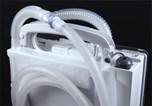DSM Somos Stereolithography Resins Deliver Medical Industry Solutions

 According to the Advanced Medical Technology Association (AdvaMed), the medical device industry grew to nearly $220 billion worldwide by 2006 and is poised to grow by yet another 10% in 2007. In this fast-paced, research-intensive sector, there is an increasing need for rapid prototyping processes and materials that can cost-effectively produce parts with challenging performance requirements including water resistance, electromagnetic interference shielding and sterilizability. For many medical device prototypes, Somos stereolithography (SL) resins are providing an attractive solution.
According to the Advanced Medical Technology Association (AdvaMed), the medical device industry grew to nearly $220 billion worldwide by 2006 and is poised to grow by yet another 10% in 2007. In this fast-paced, research-intensive sector, there is an increasing need for rapid prototyping processes and materials that can cost-effectively produce parts with challenging performance requirements including water resistance, electromagnetic interference shielding and sterilizability. For many medical device prototypes, Somos stereolithography (SL) resins are providing an attractive solution.
Clear, Water-Resistant Prototypes Vaupell Rapid Solutions, part of an international company that supplies sophisticated molded products, has participated in the design review phase of over 1,000 medical devices over the last decade. During this time, they have successfully relied on stereolithography for its accuracy in prototyping devices for the assessment of form, and function.
One of Vaupell's customers is among the world's largest manufacturers of chest drains (used after open heart surgery)-a device that must incorporate clever methods of controlling and monitoring flow in its design.
Clear, water resistant prototypes are required to effectively evaluate proposed chest drain designs. While multiple rapid prototyping (RP) processes may be used (cast urethanes, CNC machining, etc.), a quicker, more cost-effective solution has been found using stereolithography with Somos WaterShed 11120 resin.
With optical clarity and a low water absorption of 0.35%, Somos WaterShed is also tough enough to use in functional testing (having a flexural modulus of 2200 MPa and elongation up to 20%). Since its initial availability, WaterShed has been used a in multiple iterations of multiple chest drain designs to save time and money, and improve function.
"Vaupell prides itself on using the right prototype solution for the job," says Steve Ettelson, General Manager of Vaupell. "We're finding that a broad range of Somos resins-including WaterShed 11120- enables us to provide the best solution to our customers for the wide variety of prototyping challenges."
Highly Detailed Prototypes
For those developing medical devices such as inhalers, intravenous fluid delivery pieces, syringes, surgical tools, diagnostic equipment and housings, rapid prototyping success has been found using another Somos resin that delivers a different set of material qualities. FineLine Prototyping, a stereolithography service bureau based in North Carolina, uses Somos NanoToolTto create extremely accurate high-detail parts that are also highly heat-resistant.
NanoTool is a reinforced composite material with a heat deflection temperature >500°F (after thermal post-cure) and a flexural modulus value of 10,000MPa. The resin's very low linear shrinkage (<0.001") allows for extremely accurate and high detailed parts to be made.
"It's rare to find a material that is both tolerant of high temperatures and able to create accurate, fine details," raves Rob Connelly, President of Fineline. "NanoTool does both with ease. In addition, we have many medical device manufacturers who use NanoTool in combination with structural nickel to make prototypes of parts that would normally be die cast or investment cast metals."
In fact, a 20-30% metal-to-resin volume ratio using NanoTool is enough to produce parts with a tensile strength similar to a variety of alloys including Mg, Al and Zn, but in much less time. In addition, as little as 0.002" Nickel plating allows the SL parts to be used for electromagnetic interference shielding.
"NanoTool's extreme stiffness and strength, coupled with the toughness of the nickel coating create a very stiff, strong part," states Connelly. Beyond strength, NanoTool delivers "amazing sidewall quality that requires little or no finishing" that results in faster production of metal plated parts.
With Somos' growing line of SL resins delivering clarity, water-resistance, toughness, accuracy, and high heat tolerances, stereolithography is proving to be a smart, cost-efficient solution for prototyping in today's medical/bioscience industries.
To learn more about WaterShed, NanoTool or metal plating visit the DSM Somos website at www.dsmsomos.com.
SOURCE: Advanced Medical Technology Association
